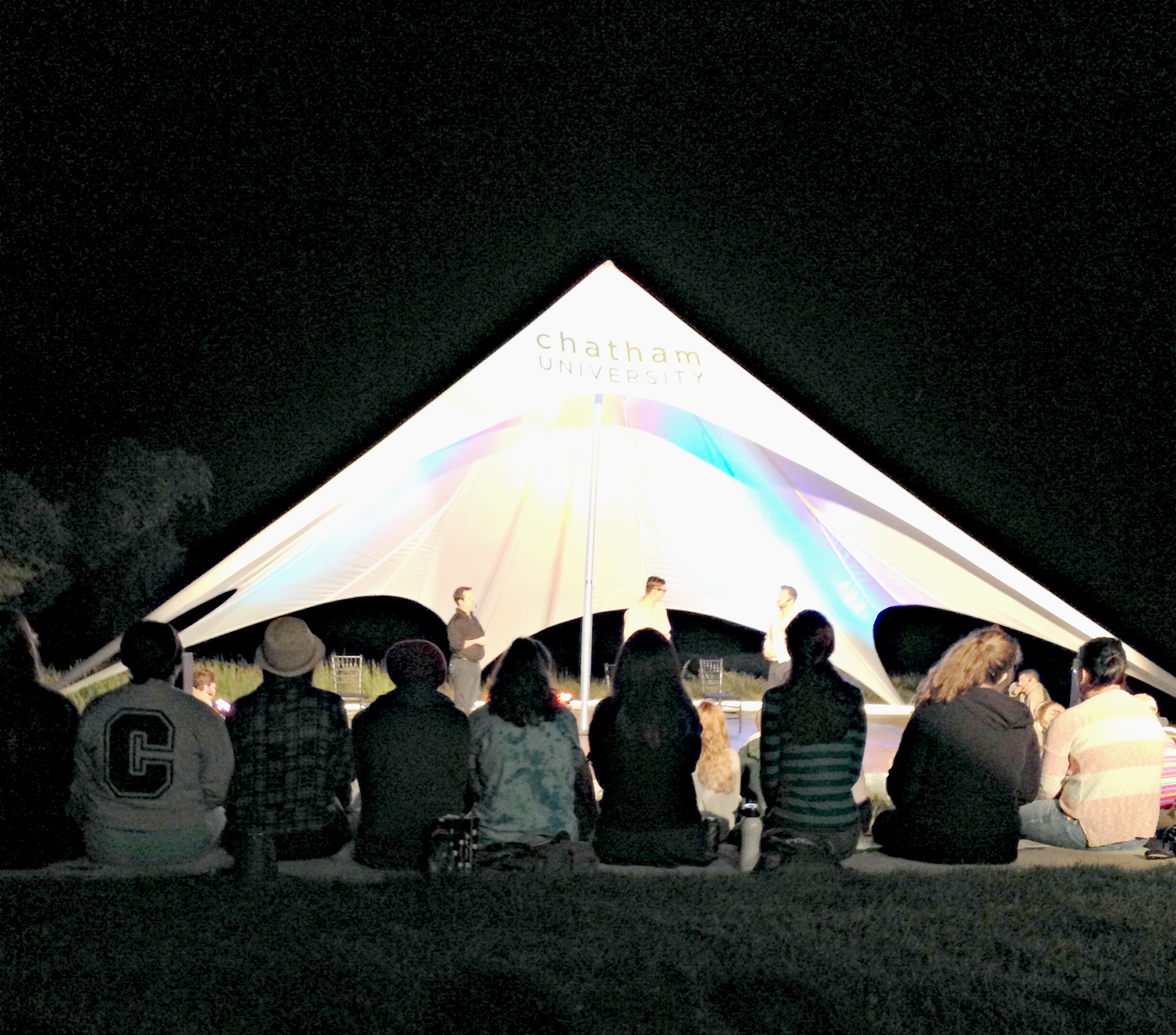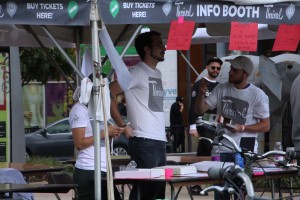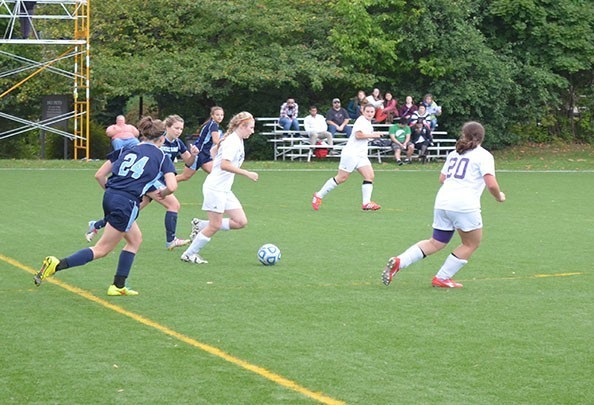William Shakespeare, considered by many as one of the greatest playwrights in history, is famous for his comedies and his tragedies; however, in his day, Shakespeare never combined the two genres quite like The Improvised Shakespeare Company did in their performance at Eden Hall’s Hilda M. Willis Amphitheater on Thursday, September 18.
The crowd included students, visiting for pleasure or extra credit; members of the general public; the Falk School of Sustainability’s Dean Peter Walker; and Chatham University President Esther Barazzone.
The Improvised Shakespeare Company, as their name suggests, improvises plays based entirely on a title suggested by an audience member. Though they employ Elizabethan language and use themes present in many of Shakespeare’s works, the troop does not rehearse, pre-plan, or memorize any material.
“Everything you’re about to see tonight has been made up on the spot,” said actor Blaine Swen, as he introduced the concept. “If ever you’re wondering where the story is going, so are we.”
An audience member chose the title A Horse Named Shirley, and the play began for, as Swen said, both its world premier and its closing night.
The action began in France, in the middle of war with England. Princes James (Randall Harr) and William (Ric Walker) of England weep for their brothers fallen in battle. When their youngest brother, Ned (Josh Logan), appears–Ned was their smallest brother and, as the princes point out, he is even smaller now that his legs have been severed in battle–William swiftly kills him, leaving the two brothers alone once more.
Prince James, who is first in line for the throne now that their father has died, devises a plan to sneak into the French camp and overthrow the French King. He cuts off the mane of a horse named Shirley, fashions it into a wig, and disguises himself as a French woman to infiltrate the camp–in reminiscence of Shakespeare’s “Twelfth Night” in which Viola disguises herself as her twin brother Sebastian.
In the next scene, the King of France (Ross Bryant) and his son (Logan) converse–in heavy French accents–at their camp. The Prince wishes to find true love, and his father sets him up with a homely French woman (Walker) with a comically husky voice. The Prince thanks his father for choosing for him a fiancée who he describes as “the most beautiful flower in the field,” but questions whether she was the only flower from which to choose.
Next the audience is introduced to Penelope (Swen), the Princess of France, who wishes for a love of her own, just as her father has found for her brother. She, like Juliet before her, finds solace in her nurse and confidante.
The next scene takes the audience back to the battlefield where five surviving soldiers (played by all five members of the cast: Bryant, Harr, Logan, Swen, and Walker) discuss their good fortune, which has allowed them to survive the war. One soldier, Boyd (Swen), admits to having penned a one-act play that is a metaphor for the political situation between France and England, instead of assisting his friends in the fight; as one friend remembers, Boyd drafted part of his play on the back of a soldier slain in battle. The men decide to stage Boyd’s play, and they go off into the woods to rehearse.
Back at the French court, Prince James in disguise meets the Prince of France, who instantly falls in love with him, disguised as a “her.” Admiring the incognito James’s “strong arms” and “sausage fingers,” the Prince of France wishes to marry the masculine lady. James, spotting a chance to infiltrate the kingdom and conquer France, pretends to reciprocate the French Prince’s love.
The next scene takes the audience to Prince William and a Spanish assassin he has hired to kill his brother James so he might inherit the English throne instead, just as King Claudius killed Hamlet’s father to inherit the throne of Denmark.
Finally the climactic scene begins. The King of France is troubled by his son’s attraction to an “openly manly” woman, and speaks to the memory of his deceased wife. A guard interrupts his soliloquizing without knocking, sending the King into a fit of rage beginning with the line, “Was knocking just invented?” and ending with the murder of the guard for not respecting his privacy.
The King is then visited by his daughter Penelope longing for a fiancé; the ghost of his deceased wife urging him to find love for his daughter; and his son with his bride-to-be, the disguised Prince James of England. When James sees Penelope, he falls instantly in love, sheds his disguise, and begs to marry Penelope and begin a peaceful union between England and France. Despite Penelope’s hesitation at first–“Well, this is happening really fast…”–she soon falls in love with James as well.
As Brutus, Macbeth, and Romeo before him, James makes a tragic error: he puts down his dagger as a sign of peacefulness towards France and is stabbed in the back by the Spanish assassin hired by his brother. William then enters and is transfixed by Penelope, but she stabs him for killing her love, before screaming, “This is the worst day of my life.”
Penelope and her brother the Prince fight over the now-deceased James, and she stabs him, too. As he dies, he professes his lasting love for James, despite his actual gender.
Finally, although her father tries to convince her otherwise, Penelope then stabs herself, leaving the King of France all alone.
At this point, the soldiers-turned-actors arrive to perform Boyd’s play. Having lost his family, the King is suicidal, but Boyd makes a deal with him: if they play is good, the King will not kill himself. After the play, the King murders all of the actors in displeasure for the performance. Just before the King stabs himself, too, the mane-less horse named Shirley enters. It is the production’s last survivor.
The risqué and contemporary humor presented in a Shakespearian style kept the crowd in stitches throughout the performance. Even the actors were unable to stay in character at times, finding their peers’ additions so ridiculous they could not help but laugh. The show received a standing ovation and much cheering, followed by the buzz of audience members sharing their praise for the play.
“It was hilarious,” said first-year student Kayla Doyle. “It needs to happen again,” she said.
“I would definitely come back again and again,” said first-year student Kasi Petersen, in response to Doyle.
The Improvised Shakespeare Company performs at Chicago’s iO Theater and around the country. For more information, visit their website.








